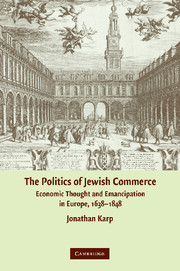Book contents
- Frontmatter
- Contents
- Acknowledgments
- Introduction
- 1 This Newfangled Age
- 2 From Ancient Constitution to Mosaic Republic
- 3 A New System of Civil and Commercial Government
- 4 The Natural Relation of Things
- 5 A State within a State
- 6 The Israelites and the Aristocracy
- 7 Jews, Commerce, and History
- 8 Capitalism and the Jews
- Afterword: Industrialization and Beyond
- Notes
- Bibliography
- Index
2 - From Ancient Constitution to Mosaic Republic
Published online by Cambridge University Press: 18 July 2009
- Frontmatter
- Contents
- Acknowledgments
- Introduction
- 1 This Newfangled Age
- 2 From Ancient Constitution to Mosaic Republic
- 3 A New System of Civil and Commercial Government
- 4 The Natural Relation of Things
- 5 A State within a State
- 6 The Israelites and the Aristocracy
- 7 Jews, Commerce, and History
- 8 Capitalism and the Jews
- Afterword: Industrialization and Beyond
- Notes
- Bibliography
- Index
Summary
John Toland was born a Catholic in Londonderry in 1670, converted to Protestantism at the age of sixteen, produced a classic of deist literature (Christianity not Mysterious) at twenty-six, and until his death in 1722 pursued a career that precariously balanced abstruse philosophical investigation with paid political propagandizing. In 1714, Toland published an extraordinary pamphlet entitled Reasons for Naturalizing the Jews in Great Britain and Ireland on the Same Foot with All Other Nations, which included the following propositions: (1) Jews should be naturalized as British subjects rather than merely tolerated; they should be granted many of the constitutional privileges of native-born Englishmen, including the right to purchase estates and to be eligible for some – although not all – state offices; (2) Jews should become more fully integrated into the general division of labor and need not be confined eternally to performing commercial tasks; (3) the faults attributed to Jews collectively are either exaggerated (in the sense that the vices of the few are attributed to the many) or where accurate merely reflect the scars of persecution; consequently, they will disappear once Jews are accorded better treatment.
Although historians generally agree that Reasons for Naturalizing the Jews impressively adumbrates the liberal outlook of the later eighteenth century, they have not viewed the pamphlet as part of an existing genre of Jewish political economy or sought to reconcile it with its author's own immersion in the party politics of contemporary Britain.
- Type
- Chapter
- Information
- The Politics of Jewish CommerceEconomic Thought and Emancipation in Europe, 1638–1848, pp. 43 - 66Publisher: Cambridge University PressPrint publication year: 2008



